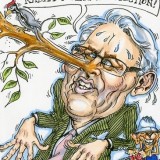“The economy is a subsidiary of the ecosystem…The only place where the environment and economy are separated is in the human mind.”
– Dr. William Rees, UBC Professor, Founder of the ‘Eco-footprint’ concept
Perhaps the most foolish and dangerous misconception of our time is that we must somehow choose between the economy and the environment. We hear it all the time. “We can’t establish green house gas emissions caps until we get our economy out of recession.”…”The environment’s important, but so are jobs.”…”We need to balance the economy with the environment.”
It’s a false dichotomy which has become the go-to defense of big polluters and the governments that enable them. We heard it with Fish Lake in BC, where Taseko Mines said they needed to destroy a fish-bearing lake to build a giant gold and copper mine. But, of course, they told us it would bring nine gazillion person-years worth of employment.
We hear it from Enbridge, the company that wants to build a pipeline from the Alberta Tar Sands to supertankers on BC’s North Coast. They too are fond of tallying up their person-years. (However, they leave out the fact that the majority of these jobs will go to people from out of province – and that they’ll last only a few years, while we’re left with the enormous environmental and economic risks from their project long after the jobs disappear).
These companies and our governments consistently create the impression that we must decide between the economy and the environment – which is short-sighted, self-interested nonsense.
The first step to dealing with both our mounting economic and environmental challenges is recognizing that the economy, as Dr. William Rees says, is a subsidiary of the environment. No fish ecology, no fishery. No forest, no forestry. No energy, no economy. No farmland, no food, no us.
We also must come to see that due to impending Peak Oil and the age of increasingly costly, scarce, dangerous, and unreliable fossil fuels, the kind of globalized economic model we have today is unsustainable. Not just environmentally unsustainable. Unsustainable, period – because it depends on a finite and dwindling resource. So regardless of whether it contributes greatly to climate change, we simply don’t have the resources to maintain this system, as former CIBC World Markets Chief Economist Jeff Rubin explained in his essential 2009 book, Why Your World is About to Get a Whole Lot Smaller.
In it Rubin relates the skepticism he’s received from the energy and banking intelligentsia over the past decade – even after correctly predicting the rise of oil to an all-time high of close to $150/barrel in 2008. He emphasizes that the key to adapting to this new world lies in the re-localization of just about every function of our economy – and the scaling down of everything we do in terms of our energy and resource-indulgent lifestyles. In other words, smaller and more local is better. This from one of Canada’s top economists and energy experts, no less.
Ponder for a moment the madness of our economic system today – and BC’s role within it. We put our ecosystems at risk by chopping down trees and mining coal – which we then ship, in raw, unmanufactured form, across the Pacific to China in tankers burning the dirtiest fossil fuel in the world (bunker diesel) – where the coal is consumed in electric plants to power the factories in which people labour under awful conditions for paltry wages, building the logs we sent them into tables that are then shipped all the way back to us…all so we can save a few bucks at Canadian Tire (which is a misnomer today, incidentally).
Of course, we get precious few jobs in this bargain. What we do get is coal smoke and diesel fumes in our air shed, climate change, and a crappy table that lasts a fraction of what it used to when we made them ourselves.
And this insanity has made abundant sense to flat-earthers like the New York Times’ vaunted Thomas Friedman (Rubin’s alter-ego). But it doesn’t make sense at $150/barrel oil, nor at $200 or $300. And that, according to Rubin and many other experts (including the late, great oil banker Matthew Simmons), is where we’re headed – very shortly. Consider that in the wake of the 2008 financial meltdown, some 12% of the world’s shipping fleet ground to a halt, with 500 behemoths hidden off the coast of Singapore for the better part of a year – a small harbinger of what is to come.
Yet Rubin somehow sees an upside to these unavoidable challenges we face – namely, in dealing with them we could create local jobs, clean up our environment, and rediscover how to live modest but fulfilling lives. Rubin writes, “Distance costs money. That will be the mantra of the new local economy.” The closer goods and food are produced to the markets in which they are consumed, the lower the transportation costs and reliance on fossil fuels. But with that we also get the twin benefit of fewer green house gas emissions (transportation accounts for upwards of 30% of North American GHG’s). Hence, once again, what’s good economically is also good for the environment.
So to both the BC NDP and Liberal leadership candidates – and to Michael Ignatieff, for that matter – I humbly submit: Build your platform on addressing both the economy and the environment together. Tell people it won’t be easy, but we can and must develop a greener, healthier, more economically and energy efficient British Columbia and planet.
Here are some planks to consider in that platform:
-Get back to growing our own food. In BC, we currently rely on imports for over half our food. We need more of our own farmers and food-producing lands – which means an investment in agricultural education and the protection and development of land that families and small-scale local farmers can afford to till to feed their own communities.
-Stop raw log exports. Truly sustainable forestry practices with local mills and enhanced manufacturing would ensure we get maximum economic benefit from one of our most important resources, while minimizing the environmental costs.
-Re-localize manufacturing in general. Our dependance on China and other low-cost labour markets has hollowed out a manufacturing base that we will surely need to develop our own goods in the near future.
-Get serious about protecting and rebuilding sustainable local fisheries. That means moving aquaculture to closed-containment, protecting and restoring fish habitat, and better managing our fisheries. That means saying “no” to things like the Raven coal mine proposal on Vancouver Island, which could destroy one of the finest oyster fisheries in the world (employer of 600 people). The seafood we’re blessed with on BC’s coast is an ecological and economic gift, which if we take care of will take care of us – as this past year’s surprise sockeye return reminded us.
-Preserve our wild places for sustainable wilderness tourism. And focus more on Canadians, many of whom have yet to experience some of the treasures in their own back yard. This would lower the industry’s dependence on emissions-heavy international travel.
-Build a proper network of public transit and pedestrian infrastructure for people movement – and electrified rail and short-sea shipping for goods movement. The construction of public transit creates far more jobs per dollar than highway paving. And by getting some of the 70% of single occupant commuter vehicles off our highways, we can free up space for goods movement, reducing lost economic productivity from gridlock – all without having to destroy our farmland or add to suburban sprawl.
-Make conservation the key focus of our energy policy. The private power industry is the antithesis of conservation, as it makes money through increased consumption – which is why it has forced grossly expensive purchase contracts on us for power we can’t use and must therefore sell at a considerable loss. Conservation is the only truly zero-impact form of energy and it frees up clean public hydro electricity to sell to our neighbours at a profit, which goes toward our schools, hospitals, and keeping our taxes low. We also need to make homes and businesses more energy efficient and, importantly, more self-sufficient – through things like small-scale wind, solar, heat pumps, and geothermal power.
If it seems that looking out for the environment and/or public interest are unpopular with the electorate, look no further than Saskatchewan Premier Brad Wall’s intervention in the sale of Potash Corp. to foreign mining titan BHP Billiton, or recently retired Newfoundland Premier Danny Williams’ reclaiming of a public hydro resource from Abitibi Bowater when they shut their pulp mill down (breaking their resource-for-jobs deal with the Province). Both were extraordinarily popular decisions with the public – in Williams’ case, he described it as the best decision of a brilliant political career. Meanwhile, a full 80% of British Columbians favour a ban on coastal oil tanker traffic – and politicians with the guts to fight for one will be duly rewarded. These platforms aren’t a tough sell with the public at all – only with a select few individuals and corporations with far too much influence over our political system.
One of the features of the Peak Oil era is that we will have less and less capital to implement the above changes. Which is why we must cease immediately building out-moded, unsustainable infrastructure and energy projects. Every dollar that we spend on paving highways over farmland is a double-whammy. Not only is it depriving us of a far more important use for that land, but it’s taking already scarce money away from public transit alternatives. Consider that for roughly a seventh the cost of the upgrades underway to Highway 1 and the Port Mann Bridge in BC’s Lower Mainland, we could get the old Interurban commuter rail line back up and running, servicing the same corridor far more efficiently and getting commuters to work faster, cheaper, more comfortably and safely.
Instead of fighting with all our might against these irrepressible forces, why not turn around and go with the flow? We must ask ourselves, is it worth all that effort and long term pain, just to forestall the end of this status quo by maybe a few more years – after which we will be far worse off for not having been proactive in changing our ways?
We might do to ask ourselves a few more questions. Like, is bigger really better? Has global “free” trade worked for most average citizens around the world – or has it simply afforded wealthy individuals and corporations better access to cheap labour and foreign resources? Are we happier as a society today than we were fifty years ago? (Skyrocketing obesity, diabetes, cancer, and depression rates might suggest that we are not). Finally, is the planet better off?
Building a future based on the inextricable relationship between the economy and environment would present the ultimate in public policy achievements – a win-win for everyone (or almost everyone).
It also just might get someone elected as the next premier of BC or prime minister of Canada…and help save the planet, which never hurts.





